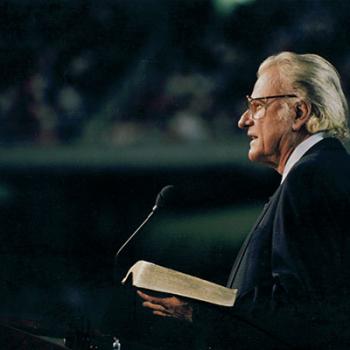I have spent the past few days pondering the events surrounding the death of Rachel Held Evans and wondering of what use it would be to contribute towards the discussion that has ensued in her passing. In some sense, I feel there is little to contribute, as many finer writers than I have given commentary on the event, expressing not only condolences to her family and those impacted by her, but have even set up GoFundMe fundraisers in order to facilitate aid for the swath of medical bills left behind. However, as I have read through the various posts from others, I did find I desired to say something about the passing of Rachel Held Evans. The reason being: death is a constant reminder for the alive to reflect, ponder, and in many cases, repent. My thoughts are varied; it is a sensitive time no doubt, but my honest hope is that in the midst of this, someone might be moved to think about what actually stands to come at the end of their own life. Think of this as more of an appeal than anything. I am appealing that you will join me in examining this occasion with the sobriety it truly deserves.
There is no shortage of words to say to this end. The death of Rachel Held Evans is tragic. It is a sobering reminder of the frailty of life–even in the midst of our booming technological advances in the field of medicine. It is a jarring wake-up call, or at least it should be, for us to recognize the power of death still consumes our loved ones and strangers alike. Things are not as they should be. Sin has broken and distorted everything; children should grow up with their mother and father; mothers should be able to rush to the help of their children and nurse their scraped knees, sweetly kiss them goodnight, and laugh at fart jokes with their little ones, despite their best efforts to explain when and where such humor is appropriate. As far as we have come and no matter how far we will go, death comes for us all. It is truly the great enemy. It is the ever-present shadow looming over our lives–our constant bedfellow. No man, woman, or child knows the day when we shall meet this adversary face to face, even though we do all we can to avoid this reality.
There is a simple pastoral wisdom in all pausing here for a moment and reflecting on the brevity of life. Most of us live with the skewed understanding that we will live to see another day tomorrow, when the reality is that no man is guaranteed even today. As my pastor (formerly an officer in the L.A. area) has aptly reflected on responding to a call, “No one ever marks the day they die on their calendar. Instead, you see, ‘Doctor’s Appointment’ for next Thursday and ‘Niece’s Birthday Party’ for Saturday. But you never see the words, ‘Today I Die.’” No man, woman, or child knows the day they will return to the dust.
For every person, death is this constant, nagging reminder to not take this life we have been given for granted. Yet we are prone to do just that as we move from one death to the next. We sense death’s shadowy presence when our beloved dies, yet do not truly contemplate the significance of what just happened. We wallow in grief, find something else to turn our attention, or simply get swept back up in the rhythm of the world around us that doesn’t seem to notice when one’s flame gets snuffed out beyond a series of online statements in memoriam.
If we will simply sit in the moment and contemplate its gravitas though, we would be better for it. Perhaps, we might ask how we can spend more meaningful time with those we love and truly cherish their life, as fleeting of a gift as that might be. Perhaps we might be moved to serve others in selflessness, bestowing generosity and love upon even those who would call us an enemy. Yet in the midst of this, what is of superlative value is to be candidly introspective in asking how we relate to God. Can we be said to be one who fears God and keeps His commandments, or have we made a name for ourselves through what can only be construed as the antithesis to this caution Solomon gives us? Do we live with an intense awareness that God will bring every deed into judgment, along with every hidden thing, whether good or evil (Ec. 12:13-14)?
For the one professing Christ, this ought to spur us on to think on how we will die. Will we die well? Will our life be one that has clearly expressed Christ, or muddied the waters? Will our lives be consistent with what the Scriptures teach is a true expression of the Christian faith, or will our life be one of constant doubt, double-mindedness, and vitriolic opposition toward that historic faith? These are questions for all who profess Christ, whether socially conservative or liberal, for death comes for us all. Likewise, these times are also for observation of another’s life when the wick has been extinguished. These observations we make can be quite alarming and revealing, if we can soberly approach them in humility. They can reveal not only the characteristics of that person, but aid in that process of introspection as we wade through the waters of our own heart’s ills.
An individual may have plumed the depths of the Bible’s teachings and articulated the gospel more clearly than veteran believers, yet he doesn’t “get it” any more than the unorthodox if he lacks the most basic of Christian practice: love. Likewise, one may overflow in an abundance of kindness, benevolence, generosity, and the like, yet if they do not embrace the historic faith, it is a false “love”. It is an expressionless “love” as its source is not rooted in a love of the Creator, nor His commands. They may manifest a quality and expression of a particular form of kindness and benevolence, but with a false conception of God, the natural result is that one embraces a false notion of love. God is the One Scripture declares is love, and thereby, love is God.
Love is not a component part of God, which is in some measure greater or lesser than all His attributes, but rather, it is identical with His essence. Apart from God, there is no such thing as love – inasmuch as there are no such things as holy, mercy, good, etc. apart from His being. Thus it must be stated unequivocally: if our conception of who God is, is at odds with the way Scripture reveals Him to be, we cannot be said to bear His qualities. We may share in some likeness to these qualities, as common grace pervades, but this does not necessitate one be in Christ to demonstrate likeness to them.
The ultimate expression of love in the believer culminates in a right doxology; proper worship involves the focus of living to the praise of God’s glory by walking in truth. It encompasses a correct conception of God and His decree, a life marked out by proper obedience to God and His decree, and jubilant praise flowing to God in recognition of His supremely excellent decree. In other words – it is wholly God-centered and born out of God’s own thoughts about Himself, which are consistent with His simple nature; His goodness, holiness, and ultimately–love.
This is particularly why we must start, continue, and end with God Himself if we are to properly understand the doctrine of love, or any other doctrine for that matter. We know that no individual loves God without God first loving them. Therefore, the one without a true conception of God cannot genuinely love, but can only express a marred shadow of genuine love upon the object of their desires. It is nothing more than a semblance of love, yet a semblance that is bound within the folly of unbelief, and thereby, it is not love at all. A concocted god matching one’s desires that is not subject to criterion outside of one’s own aspersions on the true God, only yields a concocted form of love.
If there is anything we can learn from recent events, it’s that this false dichotomy often so prevalent within those professing Christ needs to be put to death. We must not only rightly understand God to rightly relate to Him, but that right understanding must manifest itself horizontally. More clearly: a love of God for who He is will manifest itself in a love for His Word, and a love for His Word will manifest itself in a love for unbelievers and believers alike. It is this intimate marriage of truth and its manifest qualities being expressed in our lives that will evidence Christ. Yet this intimate marriage can only be expressed as a result of the One who is as He is and works as He does.
I have no doubts to the sincerity of Rachel Held Evans. She was a woman who took time out of her own day to seek to care for the masses who came to her. However noble her goals though, however vast her influence, she is culpable now for the souls misled to Hell. This is not something I rejoice in, it is frankly sad and terrifying to me in so many ways. I cannot say as others have that she is in heaven with Christ–that she was my sister in Christ–because I don’t know if she believed in the biblical Christ prior to her death. I truly hope that by the grace of God she came to see Christ as He is and love Him, truly love Him. As it stands, if I were to examine her exclusively on her teaching, barring the last-minute miracle from God, I could not in any way, shape, or form say with a clean conscience that she is in heaven. I hope that I am wrong, I truly do, but given her trajectory, I am more prone to see the consistency of the Scripture’s witness in the permanence of apostasy.
However one stretches it, she paved the path to hell for many in her desire to be inclusive in all aspects. In essence, Rachel Held Evans held in juxtaposition that the road to eternal life was broad and everyone was on it, save the many who tore down the damnable unity she fought so hard to erect. She gave a false hope–she proffered a false love, and thereby, a false god. She erected an LGTBQ calf to the known God, the God she grew up knowing, and approached Him as if He would accept such worship. She was not content to stop here though, for she took to social media quite aptly and deceived the masses.
I imagine there are many under her influence who, though they genuinely love Christ, have been deluded, much like the double-minded man. They are tossed about in every direction, blown by every new wind of doctrine, and if they are not able to be rid of the poisonous rot of Progressive Christianity, they shall be such until their own untimely death. Others have apostatized due to her teaching, being deceived into thinking that they too shall find rest at that Final Day. They have embraced a version of God that does not mirror the Scripture’s, and have scorned His Word even though, “…[God] has exalted [His] Word above [His] name” and “…[magnified] His Law and [made] it glorious” (Ps. 138:2; 140:13).
I think of how difficult her writings, Tweets, and statements have made it for small-town pastors simply seeking to be faithful to the text, their people, and their God, and how difficult that will prove to be in her lingering influence. We must recognize that even if the grace of God so overwhelmed her in a mysterious way, whatever labor she had shall be revealed with fire, and if she was saved, it will only be as if through flames (1 Cor. 3:12-15). What is truly frightening to me in this though are the verses just following, which speaks to the one destroying temple of Christ (the church):
“Do you not know that you yourselves are God’s temple, and that God’s Spirit dwells in you? If anyone destroys God’s temple, God will destroy him; for God’s temple is holy, and you are that temple” (1 Cor. 3:16-17).
While the immediate context speaks toward divisions within the church at Corinth, the biblical witness gives several other prominent ways one can destroy a church, one of which being through false teaching. In the wake of Rachel’s death, I have read more glowing commendations than truthful appeals to a life not worth imitating. Some have appropriately drawn sobriety from the events to remind us of several important truths, but the vast majority, even from conservative Evangelicals, have softened the blow death really brings, especially for the one who denies the God of the Bible. The truth we mustn’t shy away from, the truth that genuinely highlights why the house of mourning is better than the house of feasting, is that death comes for us all, and in that moment we shall either be swept up in inexhaustible wrath or inexhaustible grace.
Death does not canonize one as a saint, remove the stain of their teaching, or diminish the vitriol they attacked the historic Christian faith with. We are at no liberties to whitewash the extent of her damage to the church. One’s theological liberalism is not absolved in death, unless, of course, it is absolved in the death of Christ as one flees from their former ways. Death then doesn’t change the nature and character of the individual. Death doesn’t alter which side of the spiritual realm one exists in, it simply removes the veil and regardless of one’s former thoughts, awakens us to the full truth of the matter: the contents of our beliefs matter inasmuch as the outworking of these beliefs. The true legacy of Rachel Held Evans isn’t that she helped people stay in the church, that she was an advocate, or that she knew how to ask just the right questions. The legacy of Rachel Held Evans is one where, for those who believe the Scripture’s teaching, looks and says to the one who stumbles upon her resources, “Flee from her.”
To give three brief examples: an individual posted about the tower of Siloam, drawing out the necessary implications for conservative Christians that they ought not rejoice over the death of Rachel Held Evans, and her constituents, no doubt in their grief, blasted the man. Another posted a similar warning to my own today: that we ought to consider that one’s trajectory on earth espousing unbiblical ideals because it has grave, eternal consequences. However, she was bombarded and attacked by those who would hold they have a higher understanding of love than conservative Christians. The third comes from the retraction of John Stonestreet’s reflection originally found on Christianity Today. In his post, he had conveyed not only profound respect, but irenic reflection of the disagreements he held with Rachel Held Evans. In no sense did he say something off color, but fans of Rachel Held Evans demanded the article be taken down because it was believed to be done in malice. All of these people spoke things which were true and right to say–and these individuals found themselves in the sights of progressive Christians simply for suggesting we ought to approach death with ultimate reference to our Creator and acknowledge the plain fact that we believe radically different things about the God of the Bible. They ushered caution, without real specificity or slander, and were flogged for daring to say one word edgewise to complete praise.
The flurry of people who swarmed upon them for having the audacity to speak toward any disagreement at all was not surprising, but it only remains unsurprising because of what they learned from their mentor. This is the true legacy of Rachel Held Evans. This is the mark she left upon the world. She trained an incredibly large group of people to be devoted to making much trouble for those who proclaim the true gospel of the Scriptures; she left a rather well-equipped group of “Alex the Coppersmiths” (2 Tim. 4:14). While the pattern in the Scriptures has clearly been laid that we can and should imitate those as they follow Christ, I fear many didn’t stop to ask, “What Christ do you follow?”
In all the talk of God’s love, it makes me wonder what place there still is, even in the conservative world, to speak toward God’s wrath and holiness toward a false teacher. It is not a matter of simple disagreement. These things aren’t adiaphora. Truly, her life contains an incredibly sober warning that there are dire consequences to being found a false teacher, just as Paul gave to young Timothy (1 Tim. 4:46), just as James gave to those who wished to teach (Ja. 3:1). The amount of time in Scripture where an opponent of the gospel is spoken of in kind terms is: none. The language of rebuke toward those who mislead people, intentionally so even, ought to strike fear in our hearts when we realize that they have made an enemy of the very God who molded them in their mother’s womb. I recognize people are mourning, I recognize the pain involved; in some sense, I feel it too because I don’t delight in writing any of this–yet this is precisely why contemplating the significance of her death is crucial at this moment. Like all events on this earth, the sting of it shall fade, for some more quickly than others. If we will simply sit in this moment and contemplate the gravitas of it, truly contemplate it in all its significance, we would be far better for it.













